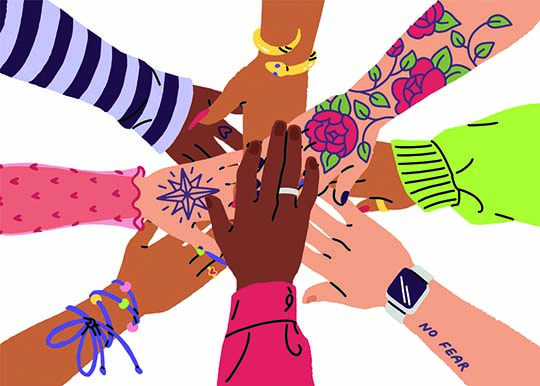By Renee Sieradski, EA As I sit in the Phoenix airport, I see several people fighting to be first in line to get the best airline seat. I overhear business...
By Renee Sieradski, EA
As I sit in the Phoenix airport, I see several people fighting to be first in line to get the best airline seat.
I overhear business men talking about what they do for work. As one businessman brags about his successful business, the man he just met asks him more questions, and then talks about his own business accomplishments.
Why do we want to be first in line and at the top of our game? Is it inborn in us to be the best? Or is it our negative self-esteem overcompensating by focusing our efforts on outward image?
I challenge all of you beautiful readers to be okay with where you are at today. This can be hard when everyone around us is doing the opposite. We would definitely be swimming against the current.
But, self-esteem is the opposite of ego-driven behaviors. Humility and self-love go hand in hand, as do pride and self-loathing.
One way to be okay with where we are today is to budget our money. Whatever we earn today, we only spend that amount. Budgeting can be a dirty word. However, in recovery, we face difficult situations with help from others.
Basic Budgeting Tips with a Recovery Twist:
Figure out exactly what you earn each month. A monthly snap shot is a common way to budget because most of us have fixed expenses that recur only a month, such as housing rent or mortgage. Some of us earn money more frequently than once per month, but we can average the previous 4 weeks and use that same figure for the following month.
List all of your fixed expenses that don’t change every month such as rent or mortgage, insurance, utilities, car loans, student loans, and so on. These are usually reported on your credit report if not paid on time — so it is a good idea to pay these on or before the due date.
Subtract your fixed expenses from your monthly income. Hopefully you have some money left over, which would be used for food and medicine. These are essential to your life and well-being. These should be considered the next priority. If you have no money left over, go back to your fixed expenses and consider how to reduce these. For instance, do your car payments, housing payment, and student loans use up all of your money? Then you may have to find lower rent, sell your vehicle and take public transportation, or re-negotiate your student loan debt.
Medicine – Taking our medication can make or break our recovery. Many of us have to take it to stay upright. For me, I have learned that if I skip taking my Selective Serotonin Reuptake Inhibitors (SSRI), I will end up losing money because I won’t be able to work.
Subtract your fixed expenses and medication from your monthly income. Divide the remaining money up into four weeks. This is what you can spend per week on food and everything else. As Americans, we are inundated with food commercials, however, spending money on eating out may be the biggest budgeting gap out there. When my husband and I dine out during the course of a month, we spend up to four times as much as buying groceries and cooking. Your budget may allow you to dine out, or it may not. Be honest with yourself. If you have a little bit of money left over, you can stretch it farther by going grocery shopping rather than dining out for most meals.
Extra funds — Now you can budget for things such as new clothing and shoes, household items, entertainment, and savings. Remember that these items are not necessary for life itself. You can live without paying for entertainment. Make sure that you place these in the budget after everything that is life-sustaining.
Credit Cards – A rule of thumb for credit cards is to only use them on two occasions: A. To gain travel rewards points —a way to get free airfare or other travel amenities, which only works out to be cost effective if we are able to pay the credit card off in FULL within the next 30 days. B. The second occasion would be an emergency situation, such as a medical emergency or a major repair on our house or vehicle. These are the only TWO events where credit cards should be used. Otherwise, you are just digging yourself into a hole, which you will not be able to climb out of.
As you start to take care of yourself financially, you will begin to feel a sense of healthy pride. As you stay out of debt and live within your budget, you will not feel financial chaos. Avoiding chaos will increase your sense of well-being and happiness. It’s not how much we earn that makes us happy, but it is how we manage what we earn and how we feel about ourselves, that makes us happy. Enjoy budgeting, make it fun!
Renee Sieradski, EA, is a Federally Licensed Tax Professional specializing in providing help for Individuals and Business Owners with any tax problems with the IRS or the State. Call 602-687-9768.































